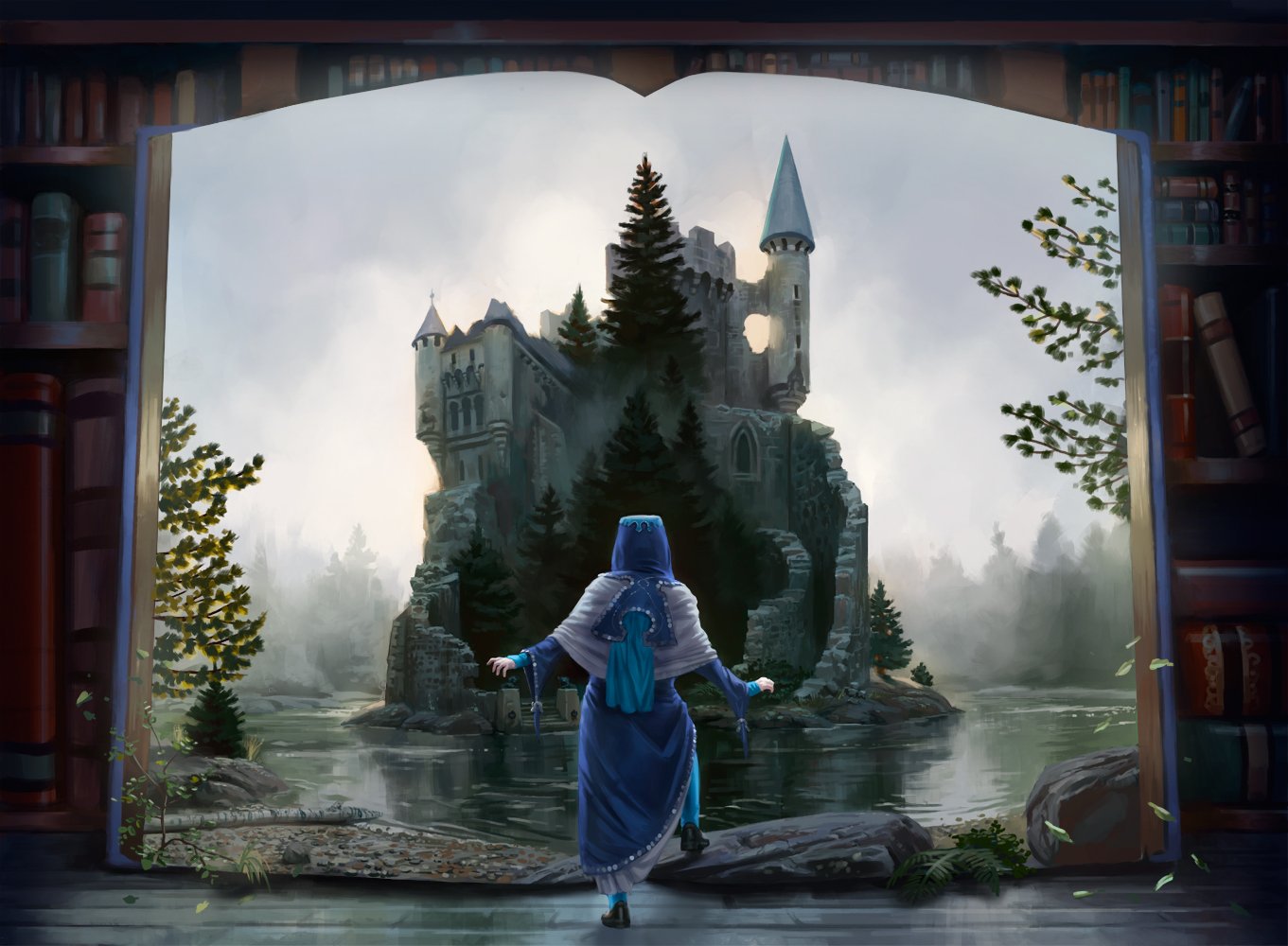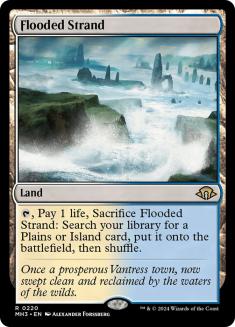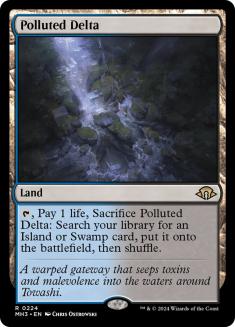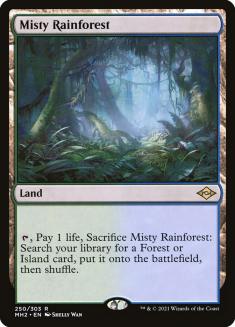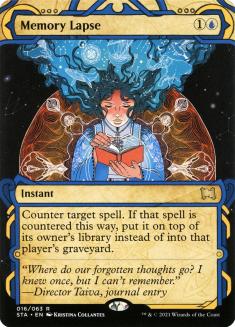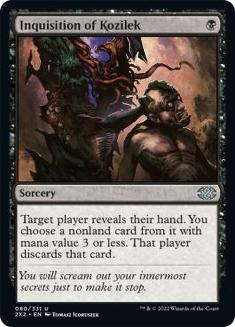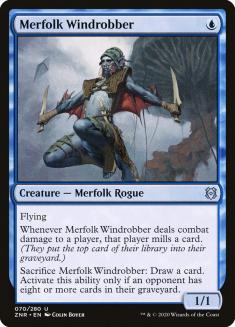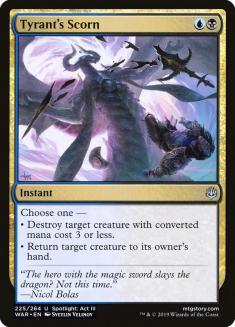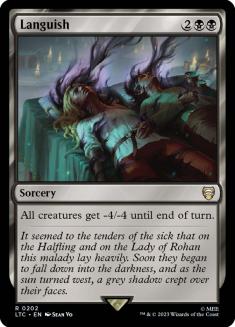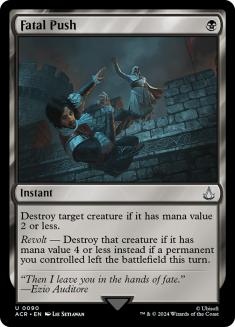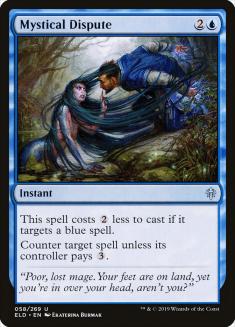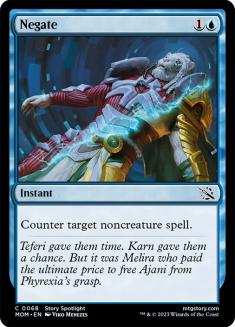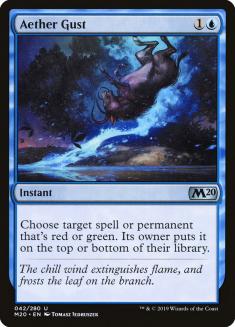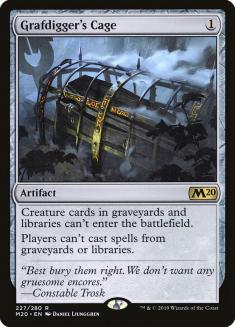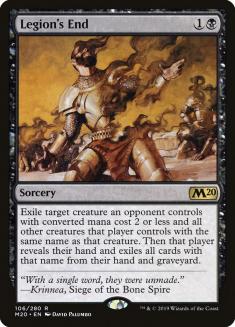Historic sure has changed.
The Mystical Archive cards have added so much juice to the format that it’s starting to look a whole lot like Modern. In fact, there are multiple staples that were recently introduced that are not legal in Modern, slowly morphing Historic into its own thing. The Mystical Archive isn’t playing around, shipping cheap interaction like Inquisition of Kozilek and Memory Lapse as well as card filtering and enablers like Brainstorm and Faithless Looting. As we struggle to grasp exactly what’s happened to Historic, great minds are already providing us with stellar lists. Yuta Takahashi, the Japanese Faeries master, took down the Insight Esports Historic Open with Dimir Rogues.
Creatures (12)
Lands (23)
Spells (25)

I’ve always been a huge fan of beating your opponent down with Flying Men while you use counterspells and cheap interaction to stall them out. Merfolk Windrobber is basically the perfect card. On their faces, these Rogues aren’t exactly impressive. However, when you get two or three on the battlefield, every single piece of disruption is magnified. Attacking with a few little creatures starts to add up quickly when your opponent isn’t allowed to resolve a spell, attack, or block.
Let’s go over the new cards and see how much things have changed. I want to stress just how powerful the Mystical Archive cards are, and how impressive it is that a single shell has incorporated three. Let’s start with a no-brainer.
Brainstorm is the best card in Legacy. I don’t think anyone wants to dispute that, as it’s been the centerpiece to virtually every blue deck forever. I’ve seen people splash for Brainstorm because their deck flooded out too much. Brainstorm coupled with a shuffle effect allows you to essentially turn two dead cards into two fresh cards, but Historic doesn’t actually have one of the easiest ways to shuffle your deck.
The lack of fetchlands in Historic means Brainstorm might be safe for the format. Fetchlands giving you a free shuffle while fixing your mana is absolutely incredible. I didn’t really understand just how good fetchlands were until they started getting reprinted into Standard with pseudo-dual lands. Battle for Zendikar Standard reshaped how I think about manabases, and showed us just how big of a problem those lands can be. Incorporate delve spells into the mix and you start to grasp why Flooded Strand and company probably aren’t getting a Standard reprint anytime soon, and I doubt they’ll be on Magic Arena for some time.
Brainstorm is still good without a fetchland, but I also have experience playing with Brainstorm without access to a bunch of shuffle effects. Pauper, in particular, is a great way to show people how mediocre it can be, while also seeing playing as a three- or four-of because of library manipulation. There are also some less-than-desirable shuffle effects we can play, but Fabled Passage is likely the best option in general. With that said, I still think Brainstorm is incredible in Historic, and much of that is due to Fabled Passage.
Memory Lapse is a head-scratcher. I never thought we’d see Mana Leak in the format, let alone Memory Lapse. I haven’t gotten to cast Memory Lapse is about fifteen years because it isn’t in Modern and was a little too weak for Legacy. In Historic, Memory Lapse is outrageous. In Dimir Rogues in particular, Memory Lapse is Counterspell when you need it to be because of your mill effects, while acting like Remand or other stop-gap interaction in a pinch. A single turn of stopping your opponent’s plan is often enough for Dimir Rogues to take control of the situation. Even if you aren’t stopping that spell on the next turn, you usually have the tools to reload at instant speed if they have a sweeper or are able to find Into the Story or another counter.
Cheap and situational counterspells flourish in a format where your opponent is casting three-mana or more expensive cards every single game. Mana Leak and Spell Pierce will dumpster an opponent who taps out for Emergent Ultimatum or similar, as you’re spending a very small amount of mana to handle an opponent’s entire turn. Memory Lapse is on a completely different level:
- You can counter anything on any turn. This aspect gets around the downside of situational counterspells by tagging anything you need to tag. If you’re afraid of it, you can stop it.
- You can use it to aggressively ruin your opponent’s draw. As the game progresses, Memory Lapse can often become Time Walk. If you tag a meaningless spell on the seventh or eighth turn, your opponent is stuck drawing that card again. When it comes to cheap creatures or similar, Memory Lapse often invalidates them completely because they lose so much value as the game progresses.
- It costs 1U. The ease of its casting cost is a real boon for Memory Lapse in Historic. I’d imagine that if Counterspell were legal, there would be plenty of decks clamoring to play Memory Lapse instead of Counterspell because it took pressure off their lands. Without access to perfect mana like Legacy, having that slightly easier casting cost rules.
I haven’t gotten to cast Memory Lapse since Psychatog was legal in Standard. I don’t know exactly how long ago that was, but I’m pumped to do it again.
Another heater, Inquisition of Kozilek has shown just how powerful it can be in a high-powered format. Since we’ve gotten an injection of cheap cards from the Mystical Archive, the average casting cost of Historic is bound to go down and stay there. It’s the nature of a game like Magic that the average casting cost of spells goes down as you add more cards to the pool because there are so many cheaper versions of the same effect. As such, you see Inquisition of Kozilek getting the nod over Thoughtseize in both Modern and Legacy on the regular.
Inquisition of Kozilek is one of the best spells ever printed. For one mana, you get to make your opponent stumble in a meaningful way. You get to strip them of a card that could be integral to their plan, or just make sure their draw doesn’t line up how they originally intended. When you start to factor in how cheap all the spells in your own deck are, you start to see just how ludicrous it gets when you’re casting two or three spells every turn cycle while your opponent struggles to do much of anything.
The majority of games are won or lost in the first few turns. If you can interact quickly and meaningfully, the advantage should be yours. If you fail to interact or end the game on your own before that happens, chances are you’re not long for this world. Magic has evolved to be more about landslide victories than close calls, which puts a lot of pressure on players to interact in those first few crucial turns. A failure to do that usually indicates a misunderstanding of the matchup or a bad mulligan decision. In the past, one might have argued that the games did not necessitate that type of early interaction because the pace was slower and cards were less powerful, but we live in a different world and have access to different tools.
How to Sideboard
If you’re looking to pick up Dimir Rogues for this weekend’s Historic events, look no further. We’re going to go over this past weekend’s major players and figure out what comes in and what goes out against all the top dogs. The format doesn’t really look the same as it did a week ago, so we’ll be using only decks from this past weekend’s events.
VS Selesnya Company
Creatures (33)
- 4 Llanowar Elves
- 3 Scavenging Ooze
- 1 Rhonas the Indomitable
- 4 Lovestruck Beast
- 4 Skyclave Apparition
- 4 Archon of Emeria
- 4 Luminarch Aspirant
- 4 Kazandu Mammoth
- 1 Reidane, God of the Worthy
- 4 Elite Spellbinder
Lands (20)
Spells (7)

In the past, I’d wager that a deck like this might be a nightmare for Faeries, but those old versions didn’t have as efficient of removal, and the clock was arguably much slower. Dimir Rogues is also more adept at playing the control role thanks to resource bursts like Into the Story. In the past, you might trade one-for-one on a bunch of spells and eventually die to a topdecked Collected Company. I find it much more difficult to run out of gas these days.
Out:
In:
We’re morphing into a more controlling strategy, so I wanted to cut some of the creatures. I find Merfolk Windrobber to be one of the better threats in the first game because it always cycles when your opponent tries to interact with it. It’s a pest with little closing speed. Thieves’ Guild Enforcer having deathtouch gives it a nod, even though it doesn’t have evasion. It allows for some trades in spots where you’re grinding. Tyrant’s Scorn and Languish are excellent here, giving you more interaction and a dagger to the heart.
VS Jeskai Control
Creatures (4)
Planeswalkers (6)
Lands (27)
Spells (23)

This control deck is one of the cooler ones I’ve seen so far, but every Jeskai Control deck basically does the same stuff. Their goal is to trade one-for-one until their big spells come online. It’s important to note that your deck should be heavily advantaged here, as your average casting costs are much smaller, resulting in you being able to dictate the pace of the game. Without Supreme Verdict, they’ll never be able to clear your battlefield for free. Their payoff is also an absurd amount of mana, making Memory Lapse a true back-breaker.
Out:
In:
Creatures good, removal bad. Fatal Push is basically a dead card, though decks like Jeskai Control have been known to pivot to creatures after sideboard. That isn’t the case here. Even though Fatal Push handles Shark Typhoon, it doesn’t trade in a way that’s worth having that dead card for most of the game. If you wanted more versatile answers to Shark Typhoon, we already have that in Drown in the Loch.
VS Mono-Red Goblins
Creatures (32)
- 4 Goblin Matron
- 3 Goblin Warchief
- 4 Skirk Prospector
- 4 Goblin Chieftain
- 4 Krenko, Mob Boss
- 4 Wily Goblin
- 1 Goblin Trashmaster
- 4 Conspicuous Snoop
- 4 Muxus, Goblin Grandee
Lands (25)
Spells (3)

We’ve seen Goblins before, and it didn’t really gain much from the Mystical Archives. They’re a bit slower than traditional aggro decks, and their reliance on Muxus, Goblin Grandee puts them at a disadvantage when paired against counterspells. Memory Lapse is incredible here because they spend so many resources trying to cast Muxus a turn or two early.
Out:
In:
Aether Gust is a standout, but Grafdigger’s Cage essentially shuts down their entire deck. While they can still cast Goblins, and the occasional Krenko, Mob Boss can pose a threat, Muxus is their only scare card. As someone who’s played quite a bit of Goblins in Historic, the feeling of playing against Grafdigger’s Cage is somewhat overwhelming. Cards like Herald’s Horn help after sideboard, but Muxus is the reason to play Goblins. Without access to Muxus, the deck has trouble winning against some of the higher-powered decks in the format.
As we do with most aggressive decks, taking out a few threats in favor of a few pieces of removal or hate is commonplace. When you shift away from that aggressive slant, you need to be prepared to take out a creature or two and become a control deck.
VS Temur Flash
Creatures (14)
Lands (24)
Spells (22)
- 2 Forest
- 2 Island
- 3 Rewind
- 3 Censor
- 3 Abrade
- 4 Growth Spiral
- 1 Sublime Epiphany
- 1 Prismari Command
- 3 Magma Opus
Sideboard

This deck, like the Jeskai one before it, is a bit too reliant on expensive spells to pose too much of a threat. It’s not hard to win counterspell battles against an opponent playing Rewind or Torrential Gearhulk, though this iteration is a bit more threatening due to the nature of their flash effects. Nightpack Ambusher, in particular, is a bit of a head-scratcher.
If your opponent ever resolves Torrential Gearhulk on Magma Opus, it’s probably time to pack it in, but stopping them from doing exactly that should be relatively simple given a decent draw. Things get a little harder after sideboard in a lot of these matchups, as they all get access to a lot of Mystical Dispute, but hopefully we can close the game before that becomes too much of an issue.
Out:
In:
Inquisition of Kozilek is a bit worse in this matchup than it should be, but it’s entirely build-dependent. If your opponent doesn’t have all those four-drops, Inquisition is much better. This is one of those decks where we wish we had Thoughtseize instead, because the higher mana cost is a small problem. That does imply that our opponent will be stumbling more on average, or will be slower in general. Slow decks get hammered by Dimir Rogues unless they have some specific threat that can’t be answered. That’s not the case here. I don’t want Grafdigger’s Cage because they have a ton of answers and all their cards still do something even if they aren’t casting them from the graveyard.
VS Dimir Rogues (Lurrus)
Creatures (12)
Lands (23)
Spells (25)

The mirror match is all about positioning on the battlefield, as one piece of pressure magnifies all of your interaction. Think about it — how much different are the games where you trade one-for-one versus when you’re trading while attacking for one to three points of damage? When you’re applying pressure to the opponent, that forces them to cast their spells into your reactive elements, or just makes them jump the gun before they’re ready.
The mirror should be attrition heavy, putting an emphasis on Lurrus of the Dream-Den and Into the Story. I’d imagine that anyone who resolves more copies of Into the Story is likely going to win, but I could also see someone fighting through a big draw spell when they have a big battlefield advantage.
Into the Story reminds me a lot of Sphinx’s Revelation, in that our goal is to cast as many cheap things as possible and then refill in a huge burst. The time we take off casting that burst of card draw is the dangerous turn, so it’s imperative that our following turn is good enough to pull us back into the game or just put the nail in the coffin against an opponent who’s stumbling.
Out:
In:
There aren’t a lot of cards I want to take out in the matchup, but a poorly timed Inquisition of Kozilek will lose you the game. There’s some value in stripping them of their Memory Lapse before casting Into the Story but I don’t feel like that’s going to happen enough. You want all your removal, and you don’t want to be too reliant on counters. If your opponent gets ahead, the last thing you want to draw is Inquisition of Kozilek because it doesn’t help you catch up. If you’re ahead, holding up mana on your opponent’s turn is desirable.
VS Gruul Aggro
Creatures (35)
- 4 Llanowar Elves
- 3 Scavenging Ooze
- 4 Burning-Tree Emissary
- 4 Voltaic Brawler
- 4 Ahn-Crop Crasher
- 4 Pelt Collector
- 4 Gruul Spellbreaker
- 2 Questing Beast
- 4 Bonecrusher Giant
- 2 Kazandu Mammoth
Lands (14)
Spells (11)
Sideboard

This deck is baffling to me. I just don’t believe that Questing Beast is better than Collected Company. If people wise up and move in that direction, becoming less reliant on Embercleave, this matchup will get much harder. As of right now, I think this matchup is fine.
Their early draws can run you over, but you have plenty of ways to disrupt their aggressive gameplan. They’re the beatdown, so we’re going to be morphing into a control deck once again in order to combat this.
Out:
In:
As weird as it might look, we don’t have a ton of time to fool around. Brainstorm is quite good, but it’s also not as powerful here as it is in Legacy. We can’t guarantee we’ll have the time to cast it or shuffle away the dead cards. In this deck and format, Brainstorm is much more about smoothing out your draws as opposed to preventing flooding out. If we spend all our time spinning our wheels, the aggro decks will beat us.
You could make an argument for Legion’s End, but the heat from Gruul comes from their three-drops. Having Legion’s End rotting in your hand against a Bonecrusher Giant is embarrassing.
VS Orzhov Humans
Creatures (28)
- 4 Thraben Inspector
- 4 Giant Killer
- 4 General Kudro of Drannith
- 4 Seasoned Hallowblade
- 4 Skyclave Apparition
- 4 Luminarch Aspirant
- 4 Elite Spellbinder
Lands (20)
Spells (12)

Humans as a clan have no real affiliation in Historic outside of General Kudro of Drannith and Rally the Ranks, but they’re good enough and the Humans are good enough that putting a small emphasis on both is fine. This deck has all the makings of a decent aggro deck, though it can go a bit longer than some other beatdown decks in the format. I wouldn’t be surprised to see this style of deck adopt Collected Company at some point.
They’re not as fast as some of the other aggro decks, and their spells aren’t exactly threatening when they aren’t swamping you with one-drops. As far as aggro decks go, this one is probably one of the easier ones to beat for Dimir Rogues because they just don’t have closing speed.
Out:
In:
We’re going more control in this matchup too, but Legion’s End is actually sick. It doesn’t tag the threes, but instead gives us a real answer to Seasoned Hallowblade. Languish and Tyrant’s Scorn are both coming in against all forms of aggro, with Merfolk Windrobber being the go-to cut when we’re transitioning away from beating down.
Memory Lapse gets cut because drawing too many reactive cards is disastrous. Try to find your removal and contain them as long as possible until you can stick a flyer or Into the Story. Memory Lapse is obviously solid against most decks, but it’s worse against folks with a lower average casting cost and when all their spells are functionally similar.
VS Boros Wizards (Lurrus)
Creatures (16)
Lands (21)
Spells (23)

“Boros Wizards” is not a phrase I thought I’d say out loud, but here we are. Specifically Wizard’s Lightning has us scouring Gatherer for Wizards that are legal in Historic. Clever Lumimancer just so happens to be a Wizard, giving the mostly red deck a good reason to splash white.
I’m scared of this deck. It has all the tools to make Dimir Rogues look absolutely foolish. The damage output is high and the average casting cost can even make us blush. As far as Lurrus of the Dream-Den decks go, this is one of the more impressive, and there’s a very good reason why PVDDR chose it for his What We’d Play: Historic deck this week. If they ever adopt Grim Lavamancer, I can’t imagine we’re ever winning a game.
Out:
In:
VS Izzet Phoenix
Creatures (13)
Lands (21)
Spells (26)

Izzet Phoenix is back in a big way, showing up all over the place on ladder. It had a fairly muted weekend as far as results go, but it still managed to put one copy into a Top 8. This is one of the few decks in Historic where it’s actively bad to mill them, making some of your creatures a liability. It won’t always be correct to attack, as giving them an extra Arclight Phoenix is a nightmare.
I expect this deck to be one of the harder matchups, because they’re trying to do a lot of the same stuff we’re doing. Removal is traditionally very bad against Arclight Phoenix, which is one of the easier ways for Dimir Rogues to interact with creatures. With that said, I don’t think the matchup is a landslide like Boros Wizards, but I certainly would rather play against other archetypes that don’t punish me for just casting my cards!
Out:
In:
Decks that focus on redundancy are often strong against discard. When every spell says “draw a card” or doesn’t give a crap about being in the graveyard, your cheap interaction becomes a lot worse. However, Fatal Push is so heinous that I can’t imagine leaving it in the deck, even if it can kill a Crackling Drake alongside Fabled Passage.
I hate Negate and other counters like that because they don’t deal with their threats. If we’re the control role, we need to be able to answer just about everything. If we take the aggro role, we need to be able to weather an attrition battle against a deck playing Faithless Looting.
Grafdigger’s Cage shines here, making sure their hammer never comes down. They have a little bit of counterplay with Brazen Borrower or sideboard Abrade, but it will most likely buy you enough time to put them in the dirt.
A Bright Future Ahead
As you can see, the Historic landscape has changed. There are already so many different decks utilizing these powerful new spells from the Mystical Archive. It’s no wonder to me that so many staples from Magic’s past have made it into the new digital realm. I had originally hoped Historic would mirror Pioneer and they’d eventually meld together. After the release of Mystical Archive, I find myself rooting for something entirely different.
I’ve been watching streams, playing matches, and generally falling in love with Historic over the last week. The new spells add depth and an electricity to the format that I had previously not felt. Just watching Ross Merriam on VS Live! cast Abundant Harvest off Dreadhorde Arcanist had me giggling. There are so many decks I want to try and far too few Rare Wildcards at my disposal.
Historic. You had my curiosity. Now you have my attention.

